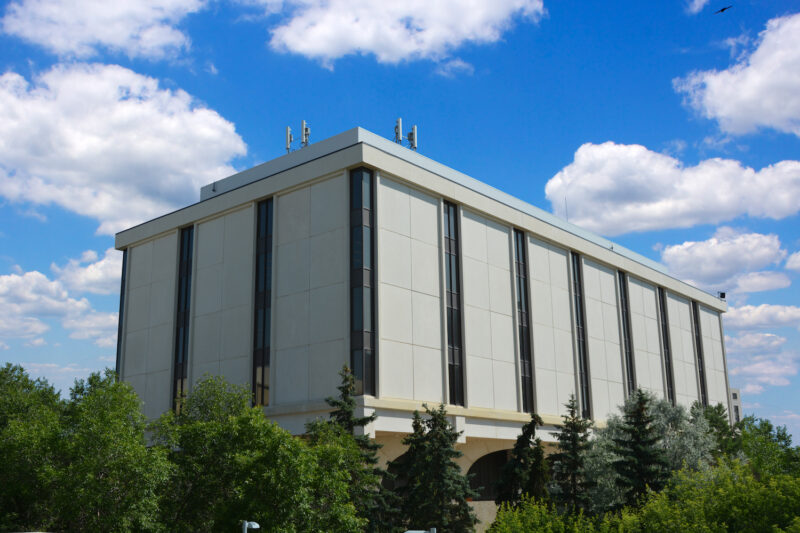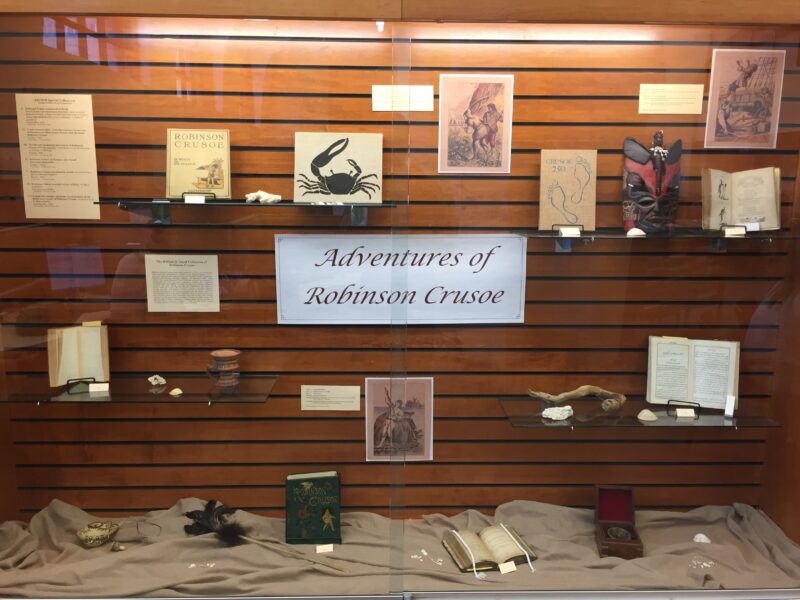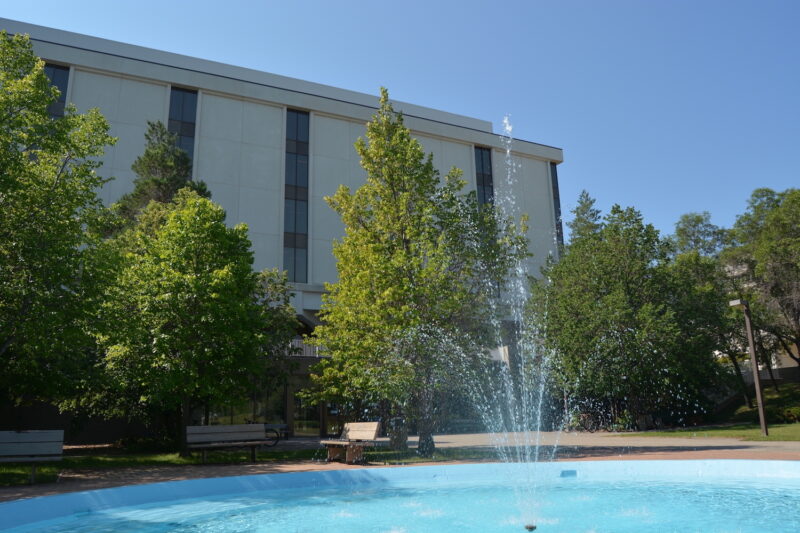Q&A with Michael Shires, URFA Member Mobilization Committee chair
Michael Shires, Collection Development and Subject Librarian at the Dr. Archer Library & Archives and chair of URFA’s Member Mobilization Committee, shares his interest in being involved with URFA, what he enjoys about his work as a librarian, and what he hopes fellow URFA members know about the association.
What interested you in becoming involved with URFA?
I was a member of that Member Mobilization Committee (MMC) in 2015 and was an observer during bargaining, which was ended up being the 2014 – 17 academic collective agreement. I became more interested in the academic unit collective bargaining process and was a member of the Job Action Committee during the negotiations in 2018 – 2019. I also wanted to learn more about the inner workings of URFA as an organization. I was appointed as the Librarians’ and Archivists’ Constituency representative to the Council of Representatives (COR). I’m in my second year now, so that’s been great and I’m a member on a few other committees. It’s been a very rewarding experience over the past five-six years.

Michael Shires is the Collection Development and Subject Librarian at the Archer Library. Photo provided by Michael Shires.
What do you enjoy about being the MMC chair?
Quite a bit — my first term as chair began in May 2019 and I’ve let my name stand ever since. I highly value the opinions and ideas of members of the committee. It’s diverse; you try and have members from all the different bargaining units.
I’ve enjoyed working with URFA’s Communications Officers. That’s sort of the connection with our group and how we work with the office.
Why is it important for URFA to have an MMC? What kind of role does this committee play and why is it valuable?
Like URFA, MMC represents all seven bargaining units. We’d love to have representatives from all seven. The purpose [of the MMC] is to encourage and support an atmosphere of active, informed participation of URFA members in the business of the association. MMC undertakes some of the publicity, education and other activities to support many objectives that are also in URFA’s strategic plan. Obviously, MMC is critical when a unit is bargaining or negotiating with the employer, and we want to get support, comments and feedback from the membership. And MMC also works in tandem with the Bargaining Advice & Support Committee and in turn supports the Negotiating Committee.
Has COVID-19 impacted the committee’s engagement with membership? If so, how?
COVID has been impactful in general due to the lack of in person connection that has been lost more or less. But there have been positive and some negative impacts with engaging members. Last fall, we started virtual tablings and the URFA President town halls. The MMC helps coordinate those help, working with the president and communications officer with drafting agendas and scheduling, so that’s critical. Despite some of the obviously negative impacts of COVID, I think we’re reaching members in a different way online and that’s been successful.
Shifting gears to focus more on your work — what is a Collection Development and Subject Librarian?
First, I’ll mention that all librarians and archivists at Archer Library hold faculty status, so there are 14 in-scope librarians. There are also more than 30 library and archives employees who are in other bargaining units. Regarding collections, I coordinate reviewing some faculty requests for new physical and e‑book purchases. Decisions are based on various criteria: price, if it supports teaching, research and curriculum development.
I also oversee physical book donations, but we do get the odd donation of music records and items that might be suitable for placement in special collections, like older materials. We can often be gifted with unique titles, or at times we’re relying on faculty requests for new items to support curriculum and research. When faculty retire, they often will think of the library and donate their materials. I love donations work. It’s really interesting — it’s kind of like getting gifts, so it’s fun.
Regarding being a subject librarian, I provide library supports, which include instruction and showing how to use our online resources and services, providing research and reference assistance to students and faculty in different departments and faculties. Part of that library support involves, especially with students, instilling a knowledge of information literacy which involves developing critical thinking skills and evaluating sources used in the library’s many databases.

Archer Library. Photo by Jason Cawood.
Part of your work is exploring and fulfilling requests for new resources. Do you also seek out new resources or materials?
For collections, we have a committee called CAT, or the Collections Assessment Team. CAT includes the Head of Technical Services and Collections, myself, and other subject librarians. We meet regularly throughout the year and assess database license renewals. Decision-making is based on various criteria including usage statistics, cost per download and how resources support teaching, research, and curriculum development. When funds are available, offers for one-time purchases of specialized online historical collections are discussed.
How has your work as a librarian been impacted by COVID-19 and what adaptations have you made?
Like everybody else, we quickly and fairly successfully pivoted to serving the university community online last March. But it wasn’t much of an issue for the more than 50 librarians and library staff. One of the main reasons is that many of our resources have been online for decades; you can access them from anywhere. One challenge was how people could request to loan materials in our physical collections when those areas in the library building were closed.
For the most part, the library’s main floor has been open by appointment where people can book a time and come in for books that we cannot provide as an e‑book. We have a digitization service where we can scan, based on copyright laws, a certain percentage of a book and then it can be uploaded onto an instructor’s reading list in UR Courses. This service was in place before COVID, but knowledge of that, and demand, has increased tremendously.
The library has provided access to many more e‑books temporarily that other libraries have scanned. It’s kind of a consortium of libraries sharing their resources.
In my case, with donations, that’s crawled to a halt. I’ve reviewed one major donation but there are many boxes I need to go through, something I cannot do at home. A lot of my meetings with colleagues and some library instruction sessions, I have done online, which has advantages and disadvantages, but it works. Like others, I miss the hallway conversations, the face-to-face.
The common misconception is that the library closed. We physically were closed for a while, but we’re available through Zoom, chat and email every day, seven days a week.
Is there a unique or obscure book or item in the collection you can highlight?
Our oldest book is in special collections. It’s in Latin and I’ve got the Google translation: In the Hebraic Questions on Genesis as well as over the twelve to take the explanation of the Divine Jerome the younger and the four prophets, by his parents, with the privilege of the newly impresse Commentaria in the Bible by heart. It was published around the year 1497 CE. The binding’s been redone but the pages are original so it’s a massive book. There’s only one copy in the world and we own that copy.
Next thing unique to Archer is we have a great collection of different editions of the novel Robinson Crusoe. The book turned 300 years old in 2019. We have one of the biggest collections of Robinson Crusoe novels in Canada, getting back to like the 6th edition up to copies in different languages; we have a copy in Pitman shorthand.

Photo provided by Michael Shires.
There are so many books. How does a library decide which novel to collect?
That’s really part of collection development and donating. When I was given this assignment of special collections, it was determined that Dr. John Archer, who was the head of the University of Regina Library at the time back in the early 70s, purchased many old books on different subjects. He purchased this collection from a bookseller in Montréal in the early 70s and it included all of these Robinson Crusoe titles.
What do you find the best part of being a librarian?
I really enjoy the one-on-one sessions with students — you can really spend a lot of time and answer the questions and do some searching with them. And then there is that moment where they begin to understand, it’s a cyclical process of defining your research topic, narrowing it down, choosing a database, developing a search strategy, finding relevant articles, maybe going back and revising. It’s a circular, cyclical process. And if students can understand that, then I’ve been successful.

Archer Library. Photo by Jason Cawood.
What interested you in this career?
Going back to when I was a nerdy teenager in high school, I used to read almanacs. I liked reading historical facts and things about people and society and planets and science. I’ve liked going to libraries ever since I was a little kid, children’s programming and I had a great-grandmother who was a children’s librarian, which was rare. She graduated like 100 years ago.
My first job was actually a volunteer in the library when I was 17, but to be a library worker I went to graduate school in late 90s. But it’s more about understanding how information in the Western context is organized and there’s a whole issue of the public services side, which is the teaching and working with instructors, faculty and students. There’s the collections management side which involves working with people and then also technical services, cataloging and information technology. I wanted to get a better understanding of the bigger picture of how libraries operate on the cataloging side, how the classification system works, how libraries acquire materials, special collections.
What changed is that I really didn’t have much knowledge before graduate school about information literacy and the value of fact checking and finding information that’s relevant to what you’re looking for. And that’s the key and that takes time and it’s part of life-long learning. I want to try and instill in students that we have lots of information to help you. I’m here to help you navigate a pathway through using those materials and it’s a challenge, but I enjoy it.
Another reason why I’ve liked libraries and led me to become a librarian, was seeing other libraries around the world and how they differ with the collections. Libraries are so interesting and with public libraries, it’s one of the few places that you can enter and you’re not being told to buy something. They’re more than just a place to hold books — libraries have really expanded their roles in communities.
Is there anything that you’d like URFA members to know?
URFA is there for members year-round and there are many volunteers; there are many degrees of involvement. The grassroots level would be attending a town hall or a table in person or virtual. If you want a bit more involvement, join a committee. To get your feet wet, learn more about what some of these committees do. If you want more involvement, join the Council of Representatives, then you get more involvement with the operations of the organization, how the committees work. If you have even more interest, you could become a member of the Executive. There are different ways for people to get involved with different levels and different time commitments, so I hope people understand that. There’s a lot of work that goes on behind the scenes that people don’t realize, and I think that’s important to be recognized.
This interview has been condensed and edited.
Enjoy reading Q&As with URFA members?
Read our previous one with URFA president Dr. Britt Hall.
